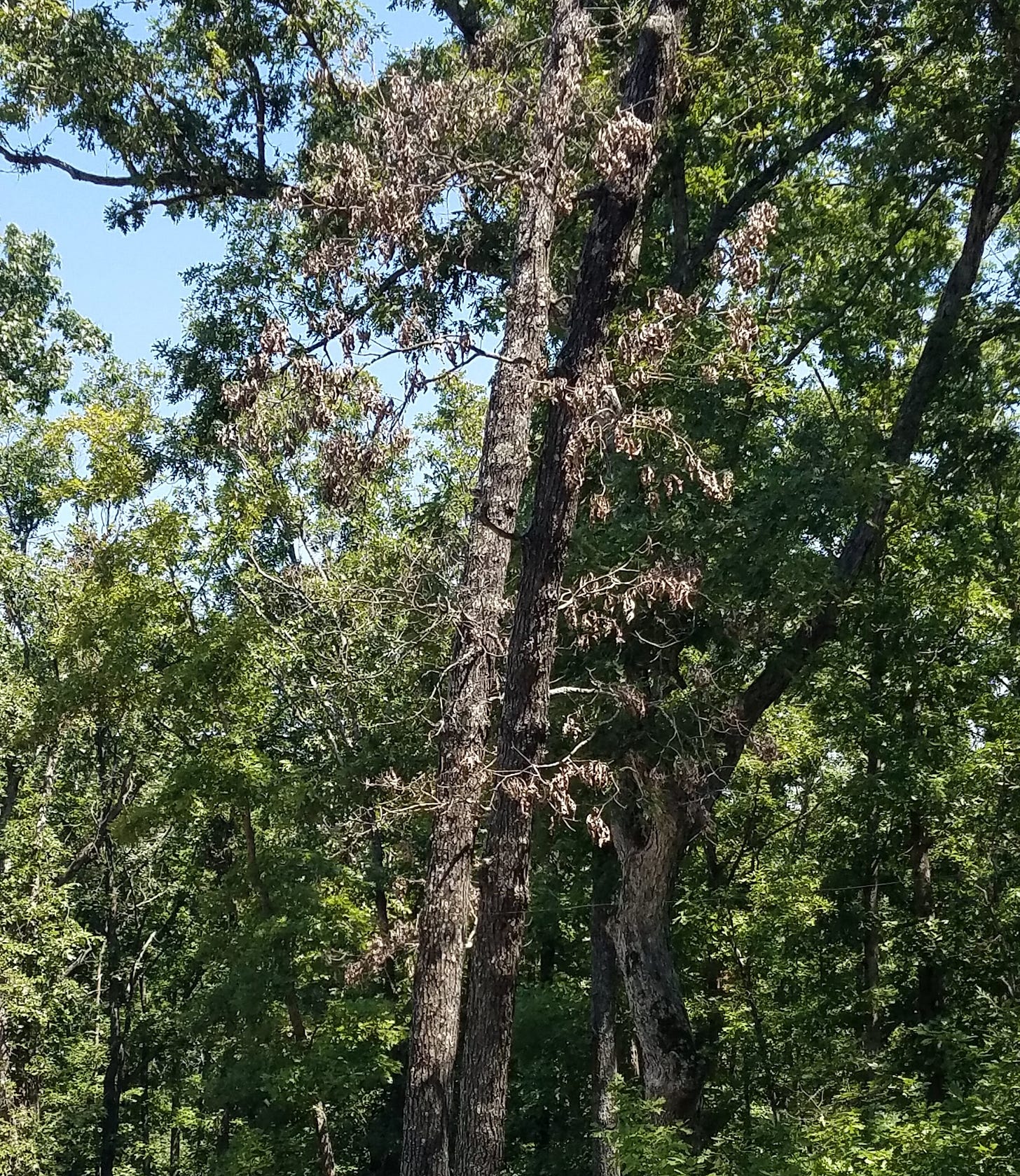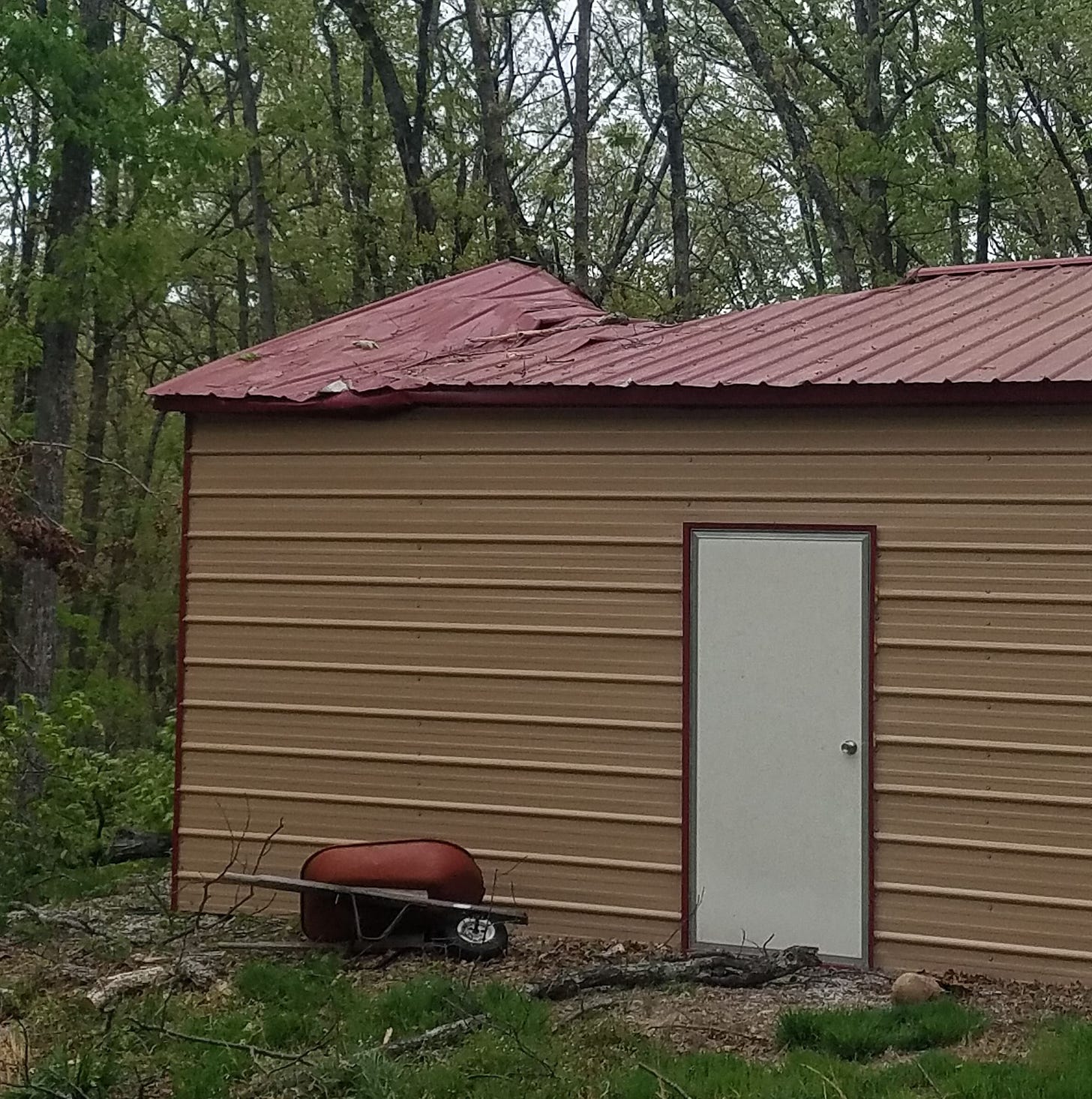Dead and Away
Not Here But Not Gone
I’m sorry your loved one has “passed away.” When death takes someone, we struggle to find words of comfort for the grieving. Death has taken a person away; they are not here but not gone.
Note about the image. One of the many dead trees at Mystery Acres.
My Mysterious Mind
This isn’t the message I wanted to share this week. That message will have to wait until another time. The horror of a public assassination of a man born the same year as my son has pushed other thoughts out of my head. The shooting occurred on a college campus, a place similar to where I have spent nearly forty years of my professional life. The motive for the sudden death of a young husband and father is hatred for words that the assassinated man said, emanating from his deeply held beliefs. My life’s purpose is the sharing of words.
I had already been thinking about death but didn’t plan to write about it, at least not this week. It’s been over seven years since my mom died. My grief has shifted recently, changing gears in a way, from something strong and heavy in the foreground to a background version of sorrow. In the first year the feeling of her being gone was stronger; now that feeling has shifted to a sense that she is just not here. It seems like she is away somewhere, a place from which she won’t be coming back any time soon. She’s not here, but she’s not gone. She’s away. I’m sad that she’s away, but not as sad as when it felt like she was gone.
Perhaps that is why some people refer to death as “passing away,” though, if I’m honest, I have never liked that expression. To me, dead is dead. Death is death. Maybe sometimes death seems like a passing away, but it certainly doesn’t when an accident or a shooting terminates a life. Being killed by a drunk driver or shot by a person filled with hatred for your words doesn’t cause the recipient to “pass away.” Such actions cause death. To use the phrase of “passing away” is to describe something horrific as gentle.
Even when death comes slowly and with warning, its ultimate arrival is abrupt and complete. I just had to take a break from writing to buy a new charging cable for my laptop. It wasn’t charging my laptop and the battery was slowly dying. Without the new cable my laptop would eventually be dead, not sort-of dead, not partially dead. It wouldn’t “pass away” slowly; at some point it would be dead and the screen black. Dead is dead. My laptop wouldn’t be alive again unless something big happened to charge it again, like a new cable.
The death of a person’s body can be peaceful, especially for those who have faith in a better life after death. For loved ones who watch someone die in a shared faith the death is less painful, but the sudden departure still leaves a wound. Death leaves a hole in those who go on living. An empty seat at the table. A missing voice in the conversation. In our minds we might believe the one we love has “gone to a better place” but it typically feels like they are just gone.
Has someone you love died? Are you in the first gear of loss where it feels like they are gone, with a gaping hole left where they once were? Or are you in the second gear of loss where it feels like they are away somewhere, not gone, but just not here? There probably isn’t a third gear where it feels completely normal to live without someone who has died. The sadness of grief shifts as the gears of loss do. Death brings a mystery of someone going away; they’re not here, but they’re not gone.
Message of Mystery Acres
Death is undeniable and irreversible in the forest as it was on the farm where I grew up. I especially remember the time pseudorabies spread through the region. All the dogs and cats died; countless pigs died. The disease didn’t cause a gentle “passing away.” No, death was horrible and ugly and everywhere. The body of an infected animal would deteriorate rapidly, often with seizures, followed by death in two to three days.
Something spread through the forest in recent years, killing several trees, mostly red oaks. One of the dead trees fell on our shed, leaving an ugly, crumpled dent across the roof on both sides, and a partially collapsed wall. A beautiful, bifurcated tree by the motorhome died. We had it professionally removed piece-by-piece. The tree debris in our sanctuary was so extensive my husband described it as “horrifying.” He has worked many hours to clear the aftermath of dead trees and there are several more still waiting to be brought down. Disease, death, and storms left ugliness behind.
I don’t remember cleaning up after the pseudorabies but I’m certain my dad remembers. And I’m confident it was ugly and horrible. Death is ugly and horrible. To this day I dislike starlings because they spread pseudorabies from another infected farm and killed all our dogs and cats.
The Osage who once occupied Mystery Acres, viewed life on earth as a trap and death as escape (Burns, 1984). They “were certain that the spirit of the dead had an existence after death” (p. 9). A person’s life is a series of steps, with “footprints on the spirit path,” everyday drawing “closer to the spirit land” (p. 9). Death didn’t bring a “passing away,” it brought freedom from the ensnarement of earthly life. To the Osage, the living aren’t the lucky ones, the dead are.
I find this view of life and death oddly comforting now. A conservative, Christian young man the same age as my son was assassinated on a university campus, a place where freedom of speech has been championed for decades. If words someone doesn’t like are deadly at a college, where are they safe? Are you, or I, safe if someone hates our words?
Death has come to the forest, just as it came through pseudorabies and it was found at the end of a gun on a Utah campus. Did the trees or the assassinated man or the pigs “pass away” in some lovely way? Not in my view. They died. Their death left behind an ugly mess. That’s what death does.
But life persists. Death ends a life, but it doesn’t stop life. In a beautiful mystery, life can come from death. Decaying trees are food for other living things. The message of Mystery Acres is a message about life and death. Because of death, the life of one person, animal, or plant may no longer be here, but life itself isn’t gone.
Ancient Mystery’s Voice
“It is appointed once to die and after that the judgement.” (See Hebrews 9:27)
Death is a distinct point in time, like an appointment. It isn’t a “fading away,” like the colors of fabric washed repeatedly. Someone is alive and then they are dead. The light is on until it is off. A person is here and then they are not here.
There may be a transition until death arrives. Sometimes we have warning, at other times we don’t. The medical staff might warn, “we’re losing him!” Death is coming. When death has come a “time of death” is declared and recorded. The appointed time has been reached. Alive shifts to dead at a definitive point.
And yet Jesus treated death like sleeping. When He arrived to heal a girl who had just died, He said, “she isn’t dead, she’s sleeping” (see Matthew 9:24; Mark 5:39; and Luke 8:52). He said something similar when approaching the tomb of Lazarus who had died three days earlier; He said, “Our friend Lazarus has fallen asleep. I am going to wake him up” (see Luke 11:11). In both cases, Jesus restored life to the dead body. After He was dead for three days, He emerged from the tomb very much alive (see various chapters including Matthew 28, Mark 16, and Luke 24 for eyewitness accounts). For everyone except Jesus, dead is dead. For Jesus, dead is sleeping.
Ancient Mystery’s Voice declares death as a specific point in time, while also describing being dead as sleeping. Unlike alarm clocks able to awaken the sleeping, there is only One who can wake the dead. The Lord of Life, He who rose from the dead, has authority to awaken those asleep in death. This mystery is beyond our mortal comprehension. For us, dead is permanent; we are powerless to fix it. But death is not a problem for God. He alone has the power to bring life from that which is dead.
Living in Mystery
What does it mean to live in the mystery of dead and away, not here but not gone? It starts with confronting the horrible pain brought by the death of someone we love. Death isn’t gentle or lovely. It comes with a hammer of finality to strike the hearts of those whose loved one has been taken away. The wounds caused by the death of someone we love become less painful over time, but they are never fully healed. Even when “gone” shifts into “not here” there is an endless sense of sorrow for the one who is loved but not with us.
A fresh loss feels worse because the first gear of grief is a sense that someone we love is gone. This can happen even for believers who are confident of a later reunion with those who have died. To be supportive of a person who is in the first gear of grief you can recognize the sense of “not here, just away” might not be how they experience the loss. The early time of fresh grief feels like a painful hole. It will help more to say, “I know it hurts; please know I am here for you,” than to say, “your loved one is in a better place.” Your presence can fill the empty spot at the table; your voice can bring missing words into the holes in the conversation.
As mortals we do not have the power to bring back the dead. We can bring their memories into conversations, comforting those who feel a void. My siblings and I bring our mother’s words into our dialogue, recalling “you know what Mom would say….” The words of the dead aren’t gone; it’s up to the living to speak those words and keep them alive.
It also helps to remember the one we love isn’t here, just away. I believe there is an incredible reunion coming, one where the Lord of Life awakens everyone who has died. I look forward to the resurrection of the dead and the life of the world to come. In that life, death is dead.
Death hurts those left to shuffle alone without the one who has died. When death takes someone we love away it leaves a lasting sadness which can lessen in time but doesn’t stop completely. In that sadness, the living can love each other and help fill the empty places left by the one who isn’t here. Our love can bring the words of the voices now silent back into our conversations. The one who has gone away in death isn’t gone; they are just not here. I believe we will see each other again because they are away, not gone.
Connecting with Mystery
Dear Lord of All Mystery, death is horrible and ugly. Help me to comfort those who are grieving the loss of someone they love who has died. Equip me with words and love to fill the empty spaces left by someone who is away in death. Thank You for being the Lord of Life, the authority over death. Strengthen me until the day it is time for all of us to be awakened by You. Amen.
Postlude About Charlie Kirk
Words are never a crime worthy of the death penalty. And, even if words were a crime, the punishment should follow due process and involve at least a judge, if not a jury. This is America. Free speech and a right to a fair trial are part of the foundation of who we claim to be. Whether you love Charlie Kirk or you think his words are vile, executing him is not something anyone should condone or applaud. No one deserves to die because of words. We cannot kill people because of words. The assassination of Charlie Kirk cannot be OK. Whether you agree or disagree with his words, his execution cannot be OK. No one should be celebrating this; killing a man for his words is not justice, or karma, or right in any way. The killing of Charlie Kirk was an assault on the safe foundation of free speech on which we all need to be able to stand. Pray for our nation. Pray for those whose words you do not like. Pray that we turn away from hatred and towards love for each other, including those with whom we disagree with their words.
Charlie’s mortal voice is silent, but his words are not gone. He was killed because of his words, but his words cannot be killed. If you are angry because of his words or angry because he was killed, Charlie Kirk said, “I'm trying to paint a picture of virtue, of lifting people up, not just staying angry.” May his death for all Americans be a turning point towards becoming a better version of ourselves.
Notes from Dr. Mac
If you want to do your own investigation of any of the scriptures I use, I suggest you go to Bible Gateway. This free online version of the Bible allows a search of words or phrases in various translations. I encourage you to read about the resurrection of Jesus in Matthew 28, Mark 16, and Luke 24.
Do you want more from my writing? I have three years of previous posts, which you can find at my ARCHIVE.
My very first post, from May 8, 2022, is Turn the Page. I have topically organized some of my previous work in the My Books section. Plus Mystery’s Voice is on Spotify.
Do you know someone who might enjoy receiving Mystery’s Voice? You can subscribe a friend or family member for free by adding an email address to my mailing list via the Subscribe button below.
I want to know what you’re thinking! You can email me at: Dear Dr. Mac or leave/send a message (see below). I love hearing from you!
Reference
Burns, L. F. (1984). Osage Indian: Customs and myths. The University of Alabama Press.




